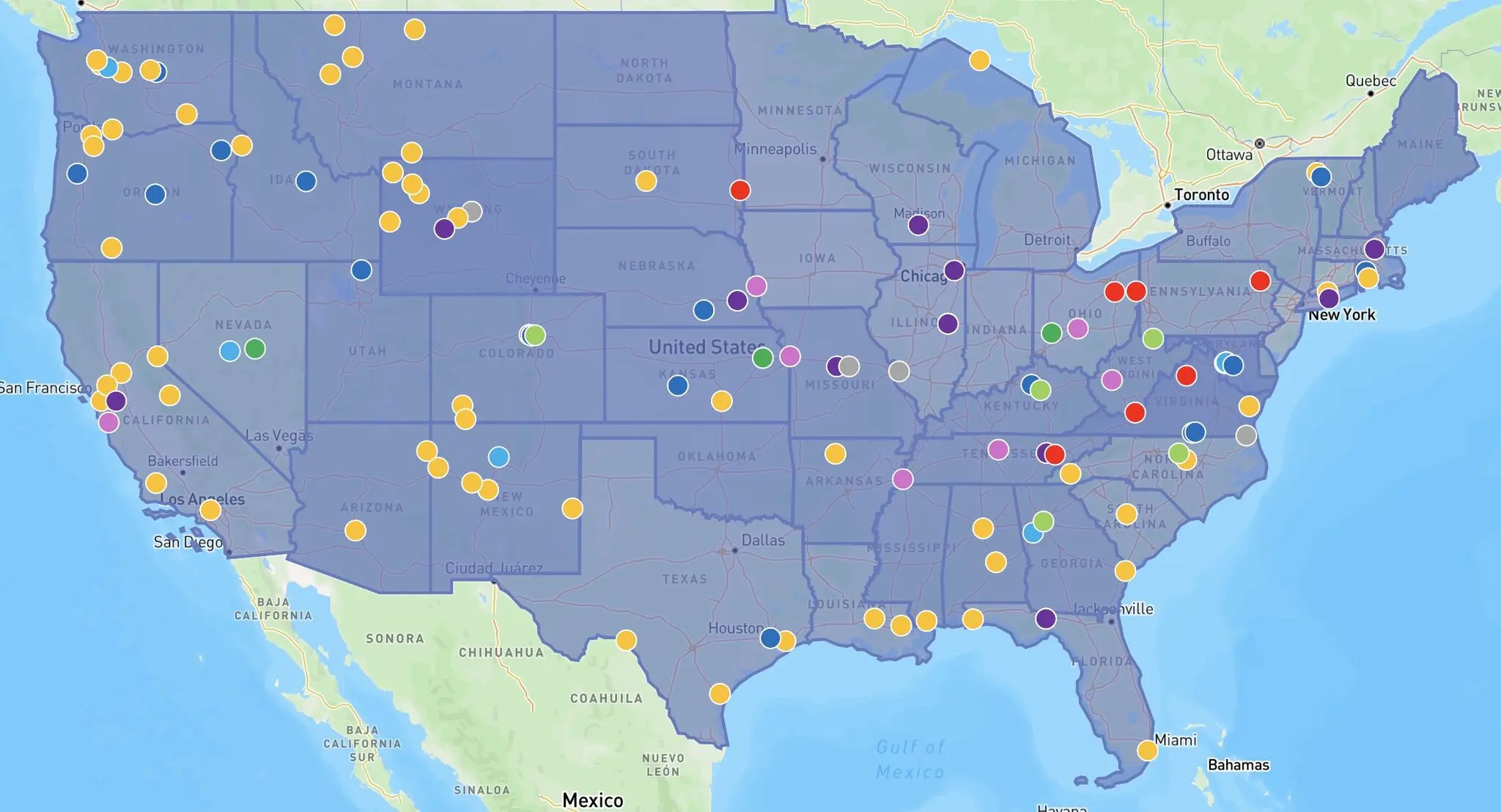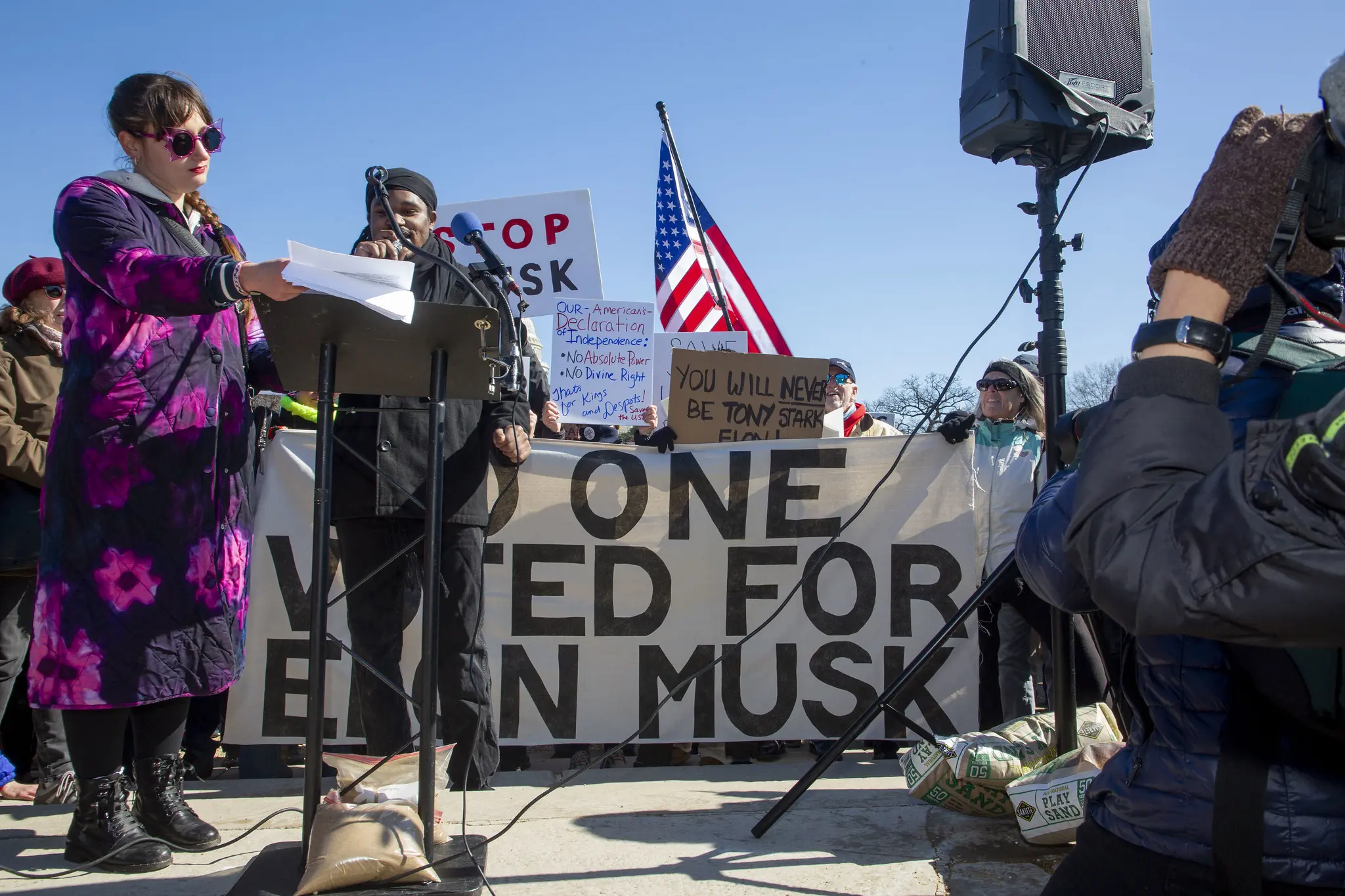In his first month as President of the United States, Donald Trump was responsible for the dismissal of thousands of employees from renowned American scientific institutions. Researchers at TU Delft are also feeling the effects.
Protest against Elon Musk's Departement of Government Efficiency on 17 feb. 2025 in Washington. (Photo: Raymond Fudge via Flickr - smata2)
Trump has taken an axe to the roots of 80 years of scientific collaboration, the British journal Nature observed at the end of last month: ‘In the aftermath of World War II, American leaders took the view that scientific progress was an essential key to our national security, better health, more jobs, a higher standard of living, and our cultural progress. And for the next eight decades, government officials on both sides of politics agreed to invest in US science. Now, scientists fear that this long-standing consensus is crumbling.’
Delta reached out to three researchers at TU Delft who are currently collaborating with American partners. How are they experiencing the dismantling of science in the US?
Wind energy projects frozen
Roland Schmehl, a wind energy researcher at the Faculty of Aerospace Engineering, describes what is happening in America as “dramatic and unprecedented”. Through social media and messages from colleagues, he is witnessing the disintegration unfold before his eyes.
In his lectures, Schmehl uses the website earth.nullschool.net, which visualises global wind patterns, among other things. The data comes from the National Oceanic and Atmospheric Administration (NOAA), an institution involved in climate research that has come under fire in recent weeks. ‘The new administration appears to be dismantling NOAA illegally,’ writes Earth Nullschool founder Cameron Beccario on LinkedIn. ‘International collaborations have been terminated, and they are preparing to lay off half of the staff – most of them researchers and technicians. Access to weather data could be cut off at any moment, either accidentally or deliberately.’
‘I think they can’t quite believe what is happening’
Schmehl also collaborates with the National Renewable Energy Lab (NREL) on wind energy research. “Our colleagues there are still relatively calm. I think they can’t quite believe what is happening,” says Schmehl. “Many, if not all, wind energy projects in the US have been put on hold. The research is continuing, but the question is for how long. So far, the projects I am involved in have not been cancelled.”
Limited impact for now
Jelle Joustra, a researcher at the Faculty of Industrial Design Engineering focusing on wind energy circularity, is also collaborating with NREL on the Recycling Wind Turbine Blades project. “The coordination of this project is shared by Derek Berry (NREL) and Justine Beauson (DTU, Denmark) and involves a large group of international participants under the umbrella of IEA Wind. It’s difficult to say what impact recent developments in the US will have – so far, they seem limited for this project,” says Joustra.
NREL remains relatively stable because its staff are not directly employed by the Federal Government, Schmehl explains. However, it is the research laboratory of the US Department of Energy (DOE), where an estimated 1,800 of the 2,000 employees have been temporarily laid off, says renewableeneregy.com.
Gaps in research
At the Faculty of Architecture and the Built Environment, Deepti Adlakha studies climate action plans in cities and their impact, particularly on public health. As part of the Beyond Business as Usual project, she collaborates with researchers at the University of California, San Diego. “Researchers there are very worried about their future,” says Adlakha, who speaks with them regularly. “The situation changes by the day.”
The San Diego team was set to report on climate action and public health in cities across North and South America. “If research funding is cut, some cities may have to be excluded from the study because there will be fewer comparison points,” Adlakha explains. “This will make it harder to assess the impact of climate policies on public health.” However, she is not concerned about the survival of her project, as it is funded by the Dutch Research Council (NWO).
Mapping the devastation

Abigail André, an environmental lawyer affiliated with Ohio State University, launched a special initiative last week to document the impact of Trump’s attack on science. She put out a call on LinkedIn urging those affected to come forward. Her post was shared 2,700 times, and she will soon publish the responses on a dedicated website.
“This is fantastic work,” commented one LinkedIn user. “Data tells the story. Please include anything that hasn’t appeared in the media. It may be difficult to verify, but there are so many stories that need to be told.”
- Have you had any experiences with US colleagues facing difficulties? Let us know via the email address below. We’ll continue to follow this story.
Do you have a question or comment about this article?
j.w.wassink@tudelft.nl


Comments are closed.